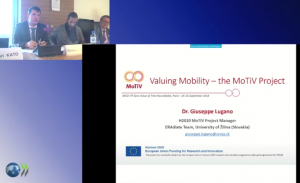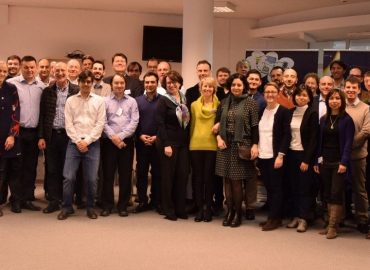The ERAdiate team was recently invited by the International Transport Forum (ITF) of the OECD to present the objectives, approach and expected results of the MoTiV project, an innovative approach to Value of Travel Time (VTT) that has raised international interest.
The OECD ITF is an intergovernmental organisation with 59 member countries. It acts as a think tank for transport policy and organises the Annual Summit of transport ministers. The ITF is the only international body that covers all transport modes. It is politically autonomous and administratively integrated with the OECD. It works for transport policies that improve peoples’ lives. The organization regularly organises Round Tables on specific topics relevant to economic and regulatory aspects of transport policies.
On 25-26 September 2018, a total of 30 experts from various disciplines and 14 countries convened in Paris at the ITF Round Table on “Zero Value of Time”, which investigated whether the Value of Travel Time Savings (VTTS) will reduce to a very low or zero value due to a variety of socio-economic, behavioural and technological factors. Among others, Round Table presentations investigated the role and significance of Information Communication Technologies (ICT) in mobility contexts and the potential of autonomous vehicles. This event was a milestone in the series of ITF roundtables: it was the fourth Round Table organised by the ITF on the topic of VTT, after those organised in 1969, 1975 and 2005. This fourth roundtable was therefore organised due to the need to review this evolving field.
MoTiV Project Manager Giuseppe Lugano was invited to contribute to this high-level transport policy event by introducing the MoTiV project. The audience acknowledged the potential of the MoTiV project to support a better understanding of the factors that determine the experience of the journey and knowledge on the choices made by the traveller. Particularly appreciated is the MoTiV plan of releasing an Open Dataset based on its European-wide data collection. This data has the potential to allow identifying additional factors to those already used in conventional value of time studies that influence the quality of a journey. MoTiV expected results may contribute to one of the central policy needs highlighted at the ITF Round Table: “Evidence on how the value of time savings might be adjusted to reflect differences in the quality of a journey opens the opportunity to extend the range of options which are presented to policy makers. Improving the quality of a journey can be as beneficial as investment to reduce journey times – the quantity of time spent on the journey. Examples of such options include investing in longer commuter trains to reduce overcrowding or providing public transport users with free wi-fi”.
Overall, the conclusions from the ITF Round Table confirm that travel time should not always be regarded as a “waste of time”. Evidence from studies in different countries illustrates the increased possibility to carry out meaningful activities while on the move, not only due to digital connectivity and personal devices but also to a variety of transport services supporting a comfortable travel experience. Concerning autonomous vehicles, although some uncertainty remains, they are believed to open opportunities for new and meaningful uses of time while travelling, thus contributing to a lower VTTS.


